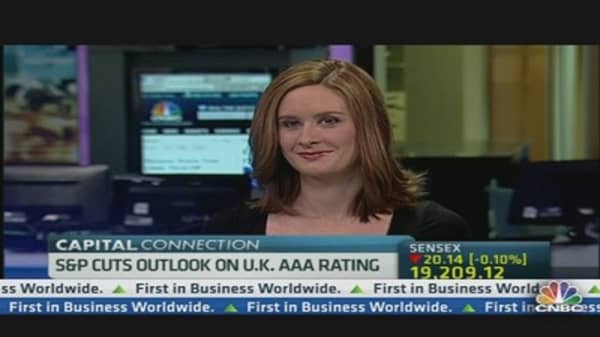Yet the impact of a downgrade could be relatively small for the U.K. Even Chancellor of the Exchequer George Osborne has downplayed the importance of the U.K.'s rating in recent weeks.
"It's one test alongside others, but the ultimate test is what you can borrow money at," he told other politicians in the U.K.'s parliament Thursday.
First of all, other major economies including the U.S. and France have suffered downgrades without a resultant spike in bond yields (which determine the cost of debt).
Second, much of the bad news for the U.K., including the deterioration in its public finances, and the threat of a triple-dip recession,is already priced in by stock markets.
A downgrade would be more symbolic than catastrophic, Simon Wells, chief UK economist at HSBC, told CNBC.
(Read More: Why Downgrade Wouldn't Be a Big Deal)
"We have survived a lot of crises with triple-A and this looks increasingly like it will be the crisis that drops the rating, but I don't think it will have huge implications," he said.
"It's really the debt position that the rating agencies are focusing on."
The U.K. has become something of a safe haven when compared to its euro zone neighbors in the bond markets. Zachary Latif, managing director at TLG Capital, told CNBC that the effect of a downgrade in yields would be "not that much."
"UK gilts are going to be a sure thing anyway," he added.
"Securities are also about the underlying issuer…The real issue is what happens at the euro zone level."
Sterling would probably suffer some decline in demand in the immediate aftermath of a downgrade, but this would not be a "sustained" weakness, according to Josh O'Byrne, currency strategist at Citi.
Written by Catherine Boyle, CNBC. Twitter: @cboylecnbc.





